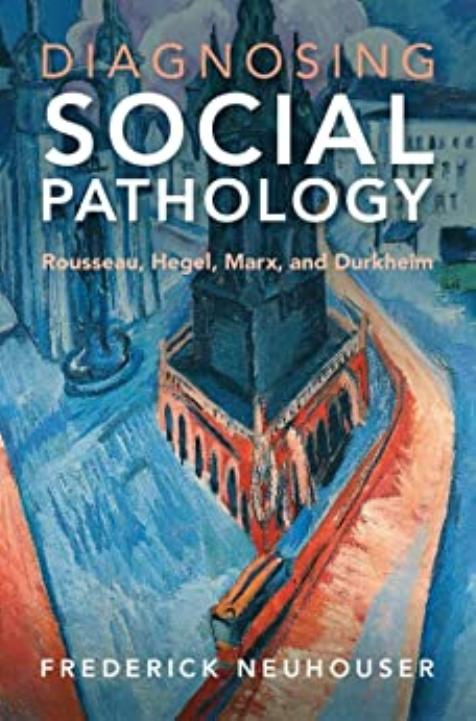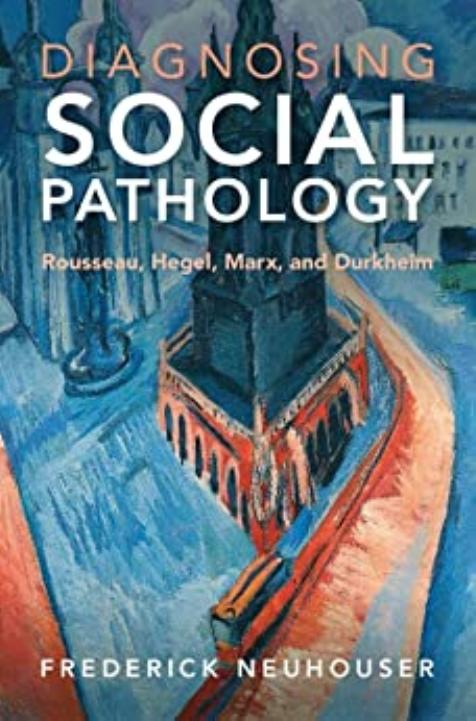Diagnosing Social Pathology Rousseau Hegel Marx And Durkheim 1st Edition by Frederick Neuhouser 1009235036 9781009235037
$50.00 Original price was: $50.00.$25.00Current price is: $25.00.
Authors:Frederick Neuhouser , Series:Pathology [289] , Author sort:Neuhouser, Frederick , Languages:Languages:eng , Publisher:CAMBRIDGE UNIVERSITY PRESS
Diagnosing Social Pathology Rousseau Hegel Marx And Durkheim 1st Edition by Frederick Neuhouser – Ebook PDF Instant Download/Delivery. 1009235036, 9781009235037
Full download Diagnosing Social Pathology Rousseau Hegel Marx And Durkheim 1st Edition after payment

Product details:
ISBN 10: 1009235036
ISBN 13: 9781009235037
Author: Frederick Neuhouser
Can a human society suffer from illness like a living thing? And if so, how does such a malaise manifest itself? In this thought-provoking book, Fred Neuhouser explains and defends the idea of social pathology, demonstrating what it means to describe societies as ‘ill’, or ‘sick’, and why we are so often drawn to conceiving of social problems as ailments or maladies. He shows how Rousseau, Hegel, Marx, and Durkheim – four key philosophers who are seldom taken to constitute a ‘tradition’ – deploy the idea of social pathology in comparable ways, and then explores the connections between societal illnesses and the phenomena those thinkers made famous: alienation, anomie, ideology, and social dysfunction. His book is a rich and compelling illumination of both the idea of social disease and the importance it has had, and continues to have, for philosophical views of society.
Diagnosing Social Pathology Rousseau Hegel Marx And Durkheim 1st Table of contents:
Chapter 1 Can Societies Be Ill?
Rival Conceptions of Social Pathology
Disadvantages of the Concept of Social Pathology
Advantages of the Concept of Social Pathology
Examples of Social Pathology: Rousseau
Chapter 2 Society as Organism?
Avoiding “Sociological Functionalism”
Social Pathology as Misdevelopment?
Chapter 3 Marx: Pathologies of Capitalist Society
Organic Analogies and Various Conceptions of Social Pathology
Defining Capital via Its Form of Circulation
Similarities between the Circulation of Capital and Processes of Life
Normative Implications of Capital’s Similarities to Life
Chapter 4 Marx: Labor in Spiritual Life and Social Pathology
Labor and Its Normative Significance
Labor in Capitalism
Why Pathology?
Chapter 5 Plato: Human Society as Organism
The Functionally Organized Polis
Chapter 6 Rousseau: Human Society as Artificial
Convention, Consent, Authorization
How We “Make” Social Institutions
Searle on the Normative Character of Social Reality
From Searle Back to Rousseau
Chapter 7 Durkheim’s Predecessors: Comte and Spencer
Auguste Comte
Herbert Spencer
Chapter 8 Durkheim: Functionalism
Functional Analysis and Explanation
What Justifies the Regulative Principle Underlying Functional Analysis?
Determining the Functions of Social Phenomena
Historical Narrative and Functional Analysis
Chapter 9 Durkheim: Solidarity, Moral Facts, and Social Pathology
Moral Facts and Solidarity
Social Pathology
Defining the Concept
Defining Anomie
Nonmoral Anomie
Moral Anomie and Hypernomie
Holistic and Nonholistic Aspects of Social Pathology
Chapter 10 Durkheim: A Science of Morality
Morality and Healthy Social Functioning
Why Moral Ideals Vary among Social Types
Sociology as Normative Moral Theory
Chapter 11 Hegelian Social Ontology I: Objective Spirit
Objective Spirit: Preliminaries
Objective Spirit in Durkheim
Descombes’s Conception of Objective Spirit
From Descombes’s Objective Mind to Hegel’s Living Good
Chapter 12 Hegelian Social Ontology II: The Living Good
Biological Life
Spiritual Life
The Good
Recognition, the Living Good, and the Bondsman–Lord Relation
Chapter 13 Hegelian Social Pathology
Animal Illness
Mental Illness as Spiritual Dysfunction
Social Pathology in Hegel’s Early Work
Material Functions of Social Life and Corresponding Pathologies
Spiritual Functioning in Social life and Corresponding Pathologies
Further Implications for Diagnosing Social Pathologies
Pathologies of Bondsman and Lord
Chapter 14 Conclusion: On Social Ontology
People also search for Diagnosing Social Pathology Rousseau Hegel Marx And Durkheim 1st:
social pathology theory
diagnosing social pathology
does social anxiety need to be diagnosed
social anxiety disorder how to get diagnosed
You may also like…
eBook PDF
Language as Social Action Social Psychology and Language Use 1st Edition by Thomas Holtgraves












